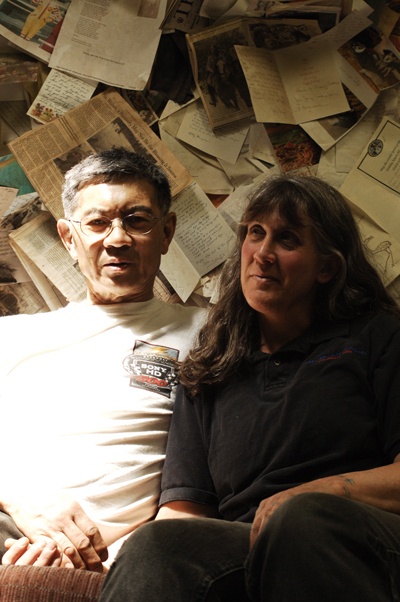Wolftown founder T Martino, an artist, author and educator, has risen to challenges big and small at the nonprofit wildlife sanctuary in the last 11 years.
When windstorms wreaked havoc on the wildlife rehab facility in 2006, she, her husband Pete Yamamoto and volunteers rebuilt the project piece by piece.
When the project’s closure seemed imminent due to lack of funds, she stoically put up her prized stallions for sale.
And when her husband underwent triple-bypass heart surgery this spring, she held down the fort at home, putting in long hours to keep Wolftown running smoothly.
Martino and Yamamoto live in a small house surrounded by wolf, sled dog and sheep enclosures at the seven-acre wooded property — purchased for the nonprofit by an anonymous supporter.
The duo operate the nonprofit on a shoestring budget and take no pay. Yamamoto, who works full-time as a race car mechanic, even supports Wolftown with his own salary. And when he underwent heart surgery six weeks ago, that salary dried up for a month.
Though Yamamoto has returned to work, for four weeks he was unable to do much at home or at his job. And because he’d used up his sick days helping Wolftown during the stormy winter, his days away from work were days without pay.
“We run strictly off donations from the community,” said Wolftown volunteer Louise Bostock. “When those fall short, Pete steps up and covers our bills. He’s been a godsend in keeping the project afloat during difficult financial times, which is pretty much all the time when you run a place like that.”
Today, the project is about $5,000 in debt, and has nearly maxed out its business line of credit, Martino said.
“If it weren’t for Pete’s work, we would really be in trouble,” she said. “The struggle goes on, because now with the recession, there is less money everywhere. Since February, we’ve been relying heavily on Pete’s salary.”
She said she’s glad Yamamoto’s back at work, because it feels like the health crisis is past.
“We’re very lucky,” she said. “It was really hard.”
The animals now at Wolftown — 11 wolves, birds of prey, sled dogs, sheep and an orphan fawn — are cared for by a dozen dedicated volunteers, Yamamoto, and Martino, for whom Wolftown is a full-time job.
Work never stops at the small wildlife sanctuary. Even Martino, 50, admits her days are long and exhausting.
On a typical day, she and Yamamoto get up at 5 a.m. He leaves for work a half hour later, and doesn’t return until dinner time.
Martino manages Wolf-town’s correspondence, spends a little time working on her latest book, spins wool from the project’s sustainably raised sheep and eats breakfast — all by 7 a.m.
Then, she makes the rounds, feeding breakfast to the domestic animals and the wildlife and milking the goats.
Every other day, the sled dogs have to be taken out for a run — when it’s cool enough, 55 degrees or less, she said.
At 9 or 10 a.m., a volunteer or two may show up to help Martino clean and muck the horse paddocks, change animals’ water, move the sheep from one enclosure to another, or repair anything that needs repair. And there is often something that needs fixing, Martino said.
“We’re a USDA-permitted facility,” she said. “That means an inspector could drop by at any time. And that means it needs to be ship-shape. The buildings, the fences, they have to be maintained.”
Next, Martino takes Wolftown’s flock of sheep out to browse for two to four hours.
“In the midst of all this, we could get a call for wildlife help that could take two hours,” she said. “It could be anything.”
Each day, the horses’ health needs to be maintained — they have to be brushed, have their feet picked out and treated for flies.
Later in the day, Martino feeds all the animals again.
“Then, I try and fix dinner for Pete and I, then we go to bed,” she said.
“After one day of volunteering, and I know I’m not doing half the stuff she does, I go home pretty tired,” said Wolftown volunteer Jan Staroski. “And to think that it’s every day? She works hard. She works really hard.”
Martino’s planning to hire an intern to help keep Wolftown going, long after she and Yamamoto are unable to do it on their own. Many of the domestic and wild animals at the project are growing old, and Martino and Yamamoto are also feeling the effects of aging.
“In 10 years, Pete and I are going to be getting ready to retire,” she said. “Maybe we’ll just handle the agriculture program and have some young people do the wildlife.”
Wolftown put out a worldwide search for the intern, who will help with wildlife care, triage care for an animal that needs help, paperwork and other day-to-day operations.
“The idea is to make them a permanent member of the project,” she said.
The intern will receive a stipend of $100 a week, and will live with an Island host family. The project is still looking for a family that will house the intern and feed him or her two meals a day, Martino said.
“Sometimes, I forget why I do this,” she said, sitting with Yamamoto in front of a wall of articles and notes from well-wishers around the world.
One note is from a little girl with a terminal illness who wrote Wolftown asking for a bit of wolf fur. Another is from a Tibetan monk who wrote to express appreciation for the project’s principle of compassion. Yet another is from someone who had a problem with a wolf, which Martino and Yamamoto helped resolve.
“I have that wall there, even though it collects dust. Sometimes I forget, and I look at the wall and I remember,” she said.



